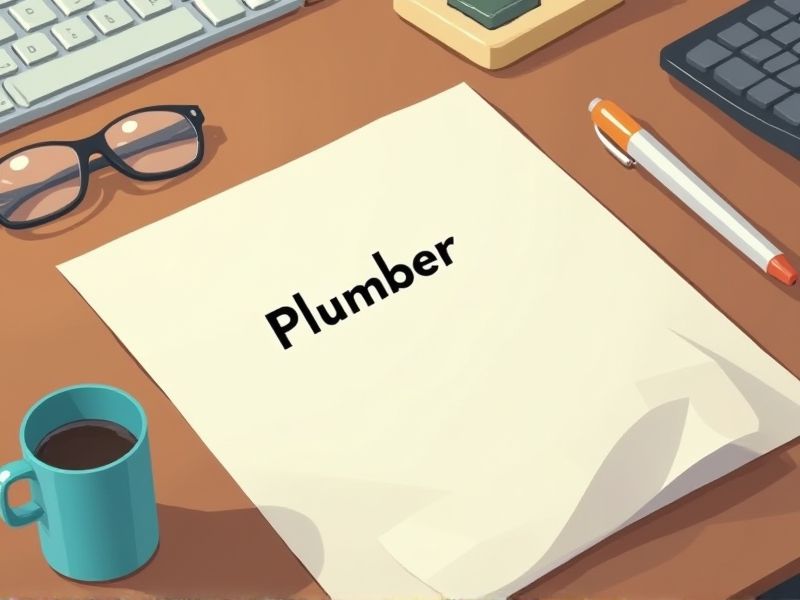
Plumbers require specific certifications to ensure they possess the necessary skills and knowledge to perform their work safely and effectively. Certifications validate a plumber's expertise in areas like pipe design, water distribution, and safety protocols, which can mitigate risks such as water contamination or structural damage. Authorities often mandate such certifications to maintain industry standards, ensuring public health and infrastructure safety. Here are some important certifications a plumber may need.
Journeyman Plumber Certification
Journeyman Plumber Certification ensures adherence to industry safety standards, reducing the likelihood of accidents and ensuring public safety. Certification demonstrates verified skill level and knowledge, increasing employment opportunities and potential earnings for plumbers. It provides an opportunity for continuing education, keeping plumbers updated on the latest techniques and technologies. Certification is often a legal requirement in many regions, ensuring compliance with local plumbing codes and regulations.
Master Plumber Certification
Achieving a Master Plumber Certification often enhances credibility and trust, as customers tend to prefer professionals with verified expertise. This certification typically leads to a higher earning potential because it distinguishes plumbers with advanced skills and knowledge. Expertise gained through certification better equips plumbers to handle complex systems and troubleshoot effectively. Many states require a Master Plumber Certification for certain projects, ensuring compliance with regulations and safety standards.
Plumbing Code Certification
Plumbing Code Certification ensures that plumbers possess the necessary knowledge and skills to comply with safety and health regulations, which helps prevent hazards like water contamination and pipe leaks. Through certification, plumbers demonstrate competency in adhering to standardized practices, fostering trust among clients and ensuring consistent service quality. Regulatory bodies use the certification to monitor and maintain industry standards, reducing the risks of malpractice and ensuring public safety. Certified plumbers are often more sought after, as they are perceived to have validated their expertise and commitment to continuing education.
Backflow Prevention Certification
Backflow prevention certification is required for plumbers to ensure public health and safety by preventing contamination of water supplies. Certification equips plumbers with the necessary skills to install and maintain backflow prevention devices effectively. Regulatory compliance mandates certification to adhere to local and state plumbing codes. Certified plumbers can reduce liability risks by demonstrating expertise in preventing potential water contamination incidents.
Gas Fitting Certification
Gas fitting certification ensures that plumbers possess the necessary skills and knowledge to safely install and repair gas systems, reducing the risk of accidents. Proper training and certification minimize the likelihood of gas leaks, which can lead to fires or explosions. Certification signifies a plumber's compliance with industry standards and legal regulations, providing assurance to customers and regulatory bodies. By limiting liability, certified plumbers protect both their business and clients from potential legal and financial consequences associated with unsafe gas fitting practices.
OSHA 10-Hour Construction Safety Certification
The OSHA 10-Hour Construction Safety Certification trains plumbers on essential safety practices, reducing the risk of workplace accidents. Enhanced awareness from the training leads to better compliance with safety regulations, decreasing potential legal liabilities for employers. The certification boosts a plumber's credentials, making them more competitive in the job market. Knowledge from the certification helps in identifying hazards, fostering a safer work environment, and promoting a culture of safety on construction sites.
NCCER Plumbing Certification
Employers often require NCCER Plumbing Certification to ensure that plumbers possess standardized industry skills. This certification verifies a plumber's proficiency and understanding of essential plumbing concepts and safety practices. With NCCER certification, plumbers can enhance their job prospects and access higher-paying opportunities. Regulatory bodies may mandate such certifications to maintain quality and safety standards within the plumbing industry.
Certified in Plumbing Design
Being certified in Plumbing Design allows a plumber to understand complex plumbing systems and design them efficiently, leading to better project outcomes. The certification enhances a plumber's credibility, potentially increasing job opportunities and higher wages. Knowledge gained through certification can lead to improved safety and compliance with building codes. Companies often prefer certified plumbers for advanced projects because it indicates a recognized level of expertise.
Water Efficiency Certification
Water efficiency certification ensures plumbers are equipped to install systems that minimize water wastage, leading to decreased utility costs for consumers. As regions experience water scarcity, certified plumbers become crucial in promoting sustainable water use practices. This certification helps in maintaining regulatory compliance, reducing the risk of legal repercussions for both plumbers and clients. Certified plumbers gain a competitive edge in the market, attracting environmentally conscious customers.
Green Plumber Certification
The rising demand for eco-friendly solutions in homes and businesses necessitates plumbers who understand sustainable practices, which the Green Plumber Certification provides. Water conservation efforts, driven by global water scarcity concerns, require expertise in efficient fixtures and systems, a focus of this certification program. Consumers increasingly seek professionals committed to environmental stewardship, making Green Plumber Certification a valuable differentiator in the marketplace. Compliance with evolving regulations around energy and water efficiency mandates knowledge offered through this certification, ensuring plumbers are equipped to meet current standards.
Summary
When you hire a certified plumber, you can expect higher quality workmanship and reliability. Certification ensures that plumbers meet industry standards, enhancing their problem-solving skills and technical knowledge. Consequently, certified plumbers are often better equipped to handle complex plumbing issues efficiently. This may lead to reduced maintenance costs and increased customer satisfaction with services rendered.
